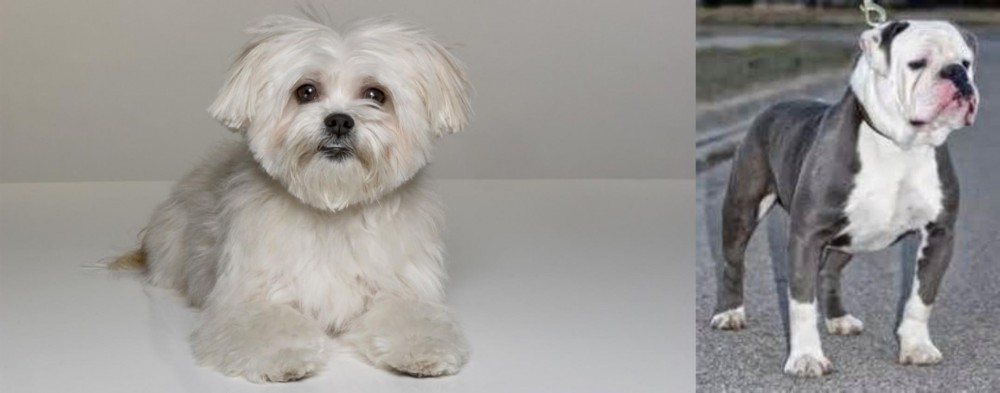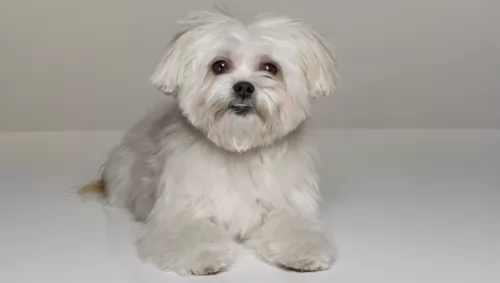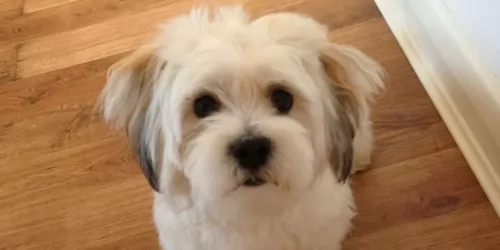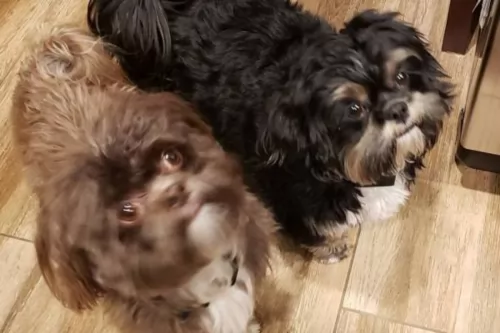 Petzlover
Petzlover Kyi-Leo is originated from United States but Old English Bulldog is originated from United Kingdom. Kyi-Leo may grow 10 cm / 3 inches shorter than Old English Bulldog. Kyi-Leo may weigh 16 kg / 35 pounds lesser than Old English Bulldog. Both Kyi-Leo and Old English Bulldog has almost same life span. Both Kyi-Leo and Old English Bulldog has almost same litter size. Kyi-Leo requires Moderate Maintenance. But Old English Bulldog requires Low Maintenance
Kyi-Leo is originated from United States but Old English Bulldog is originated from United Kingdom. Kyi-Leo may grow 10 cm / 3 inches shorter than Old English Bulldog. Kyi-Leo may weigh 16 kg / 35 pounds lesser than Old English Bulldog. Both Kyi-Leo and Old English Bulldog has almost same life span. Both Kyi-Leo and Old English Bulldog has almost same litter size. Kyi-Leo requires Moderate Maintenance. But Old English Bulldog requires Low Maintenance
 The Kyi-Leo first came about in the 1950s in San Francisco, USA, with the crossing of two dog breeds – the Lhasa Apso and the Maltese.
The Kyi-Leo first came about in the 1950s in San Francisco, USA, with the crossing of two dog breeds – the Lhasa Apso and the Maltese.
Because this is a mixed-breed dog, it isn’t recognized by the American Kennel Club, but it is recognized by some of the other dog associations such as the American Rare Breed Association or ARBA as it is known. Today the dog is looked upon as a designer breed.
 This is an extinct dog breed. It is believed that the dog came from ancient dogs such as the old Mastiff. The Old English Bulldog was the original English Bulldog but quite different from the modern variety, with longer legs as well as a longer muzzle and more aggressive.
This is an extinct dog breed. It is believed that the dog came from ancient dogs such as the old Mastiff. The Old English Bulldog was the original English Bulldog but quite different from the modern variety, with longer legs as well as a longer muzzle and more aggressive.
It is believed that the Old English Bulldog was the ancestor to many breeds and there have been efforts to recreate the Old English Bulldog, bringing about quite a few new Bulldog breeds. Records are actually unclear as to its origins and when you read up on its ancestry, you see that a lot of the information is conflicting.
A number of breeders have attempted to recreate this extinct breed with some success, but it must be borne in mind that these recreations aren’t the Old English Bulldog, as the genetics of it are extinct.
 The Kyi-Leo is a small dog standing at 20 – 30cm in height and weighing in the region of 4 – 6kg.
The Kyi-Leo is a small dog standing at 20 – 30cm in height and weighing in the region of 4 – 6kg.
He has a long, silky coat which is essentially black and white or grey/silver and white or even gold and white. He has frail legs which can become injured or broken in vigorous rough and tumble games.
You can certainly describe the Kyi-Leo as a sweet, quiet, non-aggessive playful dog, and for anyone who wants a splendid pet and companion, this dog makes a great family pet and he won’t cost you an arm and a leg to feed either.
He also has an acute sense of hearing and this turns him into an excellent ‘alarm’ watch-dog. It is also a dog, that while he will love to join you on a walk, he isn’t a dog that is going to demand a lot of exercise.
He responds well to his human family, is easy-going and gentle, tending to be cautious around strangers. You can trust him to be an awesome playmate for children. In this instance, it’s the children who should be warned when playing with a dog like this as, because of his fragile build, he could easily be injured by children who haven’t been taught to respect animals.
Even though he is such an amicable pet, it will still be of benefit to you and him to have him trained and socialized. Then he responds well to basic commands such as sit, stay and lie-down.
Dogs who spend time with their family, pick up on the ‘culture’ of the family and they learn how to behave. Dogs who are left on their own and never socialized can become nervous and aggressive towards people as they never got to learn how to behave – they weren’t socialized.
 This dog is extinct but he used to be a fairly broadly set, muscular dog, taller than the bulldog of today.
This dog is extinct but he used to be a fairly broadly set, muscular dog, taller than the bulldog of today.
The average height of this dog was 36 – 40cm, weighing in at about 18 to 22kg. One of the dog’s more noticeable characteristics was his lower jaw that projected quite a bit in front of the upper jaw. The dog was deep-chested, the head broad and the nose and muzzle short.
The breed was developed for bull baiting, but in England, with the adoption of the Act of cruelty to animals, there was a decline in the interest for the dog, leading to it becoming extinct. There are old paintings from the 1800s and one such painting, Crib and Rosa, gives an idea of the form and size of the Old English Bulldog.
The regular English Bulldog today is often confused with the Old English Bulldog but it is a far sweeter breed than the Old English Bulldog. It is believed that the Old English Bulldog was an aggressive dog, bred to be this way because of his role in bull baiting.
As a pet though, brought up as a companion, he no doubt would have made a loving, loyal pet.
 The Kyi-Leo is everything you want in a family companion – active, playful, loving, gentle, happy and balanced.
The Kyi-Leo is everything you want in a family companion – active, playful, loving, gentle, happy and balanced.
He loves his human family but tends to be a little bit wary around strangers, gradually warming to them.
He may be small, but he is robust and alert, and he is also capable of making you a good watchdog.
The Kyi-Leo is an all-round great little pet to have.
 Not much information is available on this extinct dog. Perhaps because of his history of being used for bull baiting, he wouldn’t have made a good family pet as he was too aggressive. He wouldn't have been a good choice for a first time dog owner and he wouldn't have been a good choice of pet for children.
Not much information is available on this extinct dog. Perhaps because of his history of being used for bull baiting, he wouldn’t have made a good family pet as he was too aggressive. He wouldn't have been a good choice for a first time dog owner and he wouldn't have been a good choice of pet for children.
He was possibly owned by a single person who made money from him. Small wonder then that he became extinct when he was no longer required for this role.
 Your Kyi-Leo is such a feisty, robust little dog who is not likely to cost you much in terms of health care. With his frail legs, it is a good thing to know that you need to be careful with him in terms of back-and joint problems.
Your Kyi-Leo is such a feisty, robust little dog who is not likely to cost you much in terms of health care. With his frail legs, it is a good thing to know that you need to be careful with him in terms of back-and joint problems.
There are actually knee joint issues which are fairly common in small dogs, one of which is patellar luxation.
This is where the kneecap pops out of the thighbone, causing the dog to skip or hop. Some joint issues are genetic and may require surgery. Make sure to keep your pet’s weight under control to remove additional stress on the joints.
This is another dog illness you want to be careful with. Acute pancreatitis -inflammation - is when the condition comes on suddenly while chronic pancreatitis is when pancreatitis occurs over a period of time.
With acute pancreatitis in dogs you’ll see symptoms such as vomiting, abdominal pain, tremors and reluctance to eat. Pancreatitis can be brought on by too much fat, especially rancid fat, some anti-biotics, a low protein diet or a sickness such as diabetes.
If you suspect pancreatitis in your dog, get him as quickly as possible to the vet.
 This dog, although extinct would have battled with common dog illnesses that can still be seen in the modern bulldog today.
This dog, although extinct would have battled with common dog illnesses that can still be seen in the modern bulldog today.
Brachycephalic airway syndrome is all about upper airway abnormalities and can be quite a problem in your Old English Bulldog because of the shortened muzzle of these breeds. These particular dogs have a smaller upper jaw and an overcrowding of of teeth and you will see that effort is required to inhale. They breathe more easily through the mouth then the nose. They have noisy breathing, particularly during exercise and in hot weather.
Dogs have 3 eyelids, and cherry eye is the term used for prolapsed nictitating membrane, or the 3rd eyelid, when the eyelid comes out of place and you get a pink mass. It is a common condition found in Bulldogs, a genetic problem where surgical intervention or medicine may be recommended.
 The Kyi-Leo doesn’t require vigorous exercising. One walk a day will keep them happy. There are pet owners who believe dogs can be permanently outside dogs where they can do their own exercise.
The Kyi-Leo doesn’t require vigorous exercising. One walk a day will keep them happy. There are pet owners who believe dogs can be permanently outside dogs where they can do their own exercise.
Everybody who knows dogs, knows they are social creatures who will simply lie at your backdoor just waiting for some response from their beloved human family. Every dog, regardless of breed or size, needs exercise and interaction with their humans every day.
Dogs left alone in the yard day after day are loney, frustrated and bored, and when they start digging or barking, irresponsible owners will ill treat them. These kind of people should never own a dog.
The Kyi-Leo has a sensitive stomach so he’ll need good quality food to avoid digestive problems. Ideally home-cooked food such as softly boiled chicken, brown rice and raw or cooked vegetables added into top quality kibble is the preferred diet.
Fresh, cool water needs to be constantly available.
Brush the long, silky coat at least twice a week to ensure it remains free of knotting. Brushing keeps the coat shiny too.
As a long eared dog, ears should be checked and cleaned regularly too. Air doesn’t reach the inside of their ears and the warm dampness in the ears are a breeding place for infection.
Nails should also be trimmed when they become long because left uncut they can hook onto things causing injury ad pain.
Small dogs are more prone to tartar formation and loss of teeth. You’ll notice that something isn’t right because your lively little dog will be lethargic, he may not want to eat his food and his face may be swollen. When you suspect dental problems, get him to the vet.
 If the Old English Bulldog were still around today, you would have cared for him like you would most other dogs -
If the Old English Bulldog were still around today, you would have cared for him like you would most other dogs -
Feed your Old English Bulldog puppy 4 times a day with high quality puppy food.
At 6 months of age you can be giving your young dog 2 meals a day.
Commercially manufactured food is fine if its a high quality one. Always check out the top 5 ingredients on the packaging – the first 2 should be protein or meat. Follow a simple, consistent diet to minimize symptoms. Your adult dog can have kibble and sometimes you can add in chopped boiled chicken, brown rice and vegetables such as sweet potatoes, carrots and spinach. A little bit of raw meat can also be added to the kibble once in a while. Never leave your dog without a constant supply of fresh, cool water.
Even though the dog is extinct, dog owners of that time would have had to watch their dogs for ticks and fleas and any of the common dog illnesses of that time.
The dog would have had some kind of grooming – a brush down a couple of times and he would have been checked for ear and eye infections.